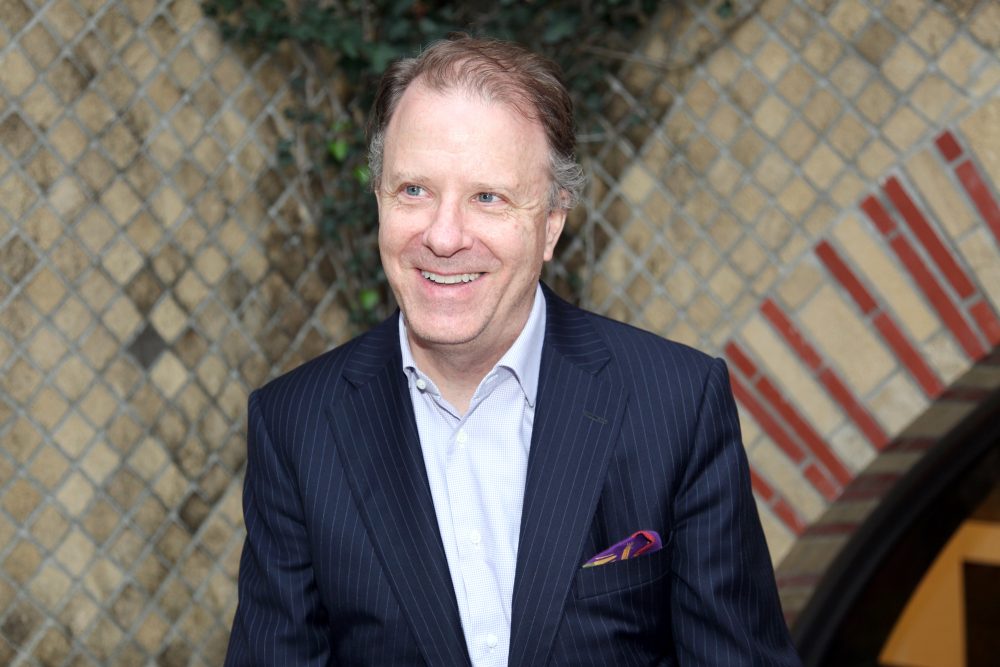
Photo by Aaron Salcido.
Joseph Manning is a Yale University professor of history and classics, specializing in Hellenistic history with particular focus on the legal and economic history of Ptolemaic Egypt. Before taking part in a Zócalo/Getty Villa panel discussion titled “What Can the Ancient World Teach Us About Living Sustainably?” at the Getty Villa, he spoke in the green room about the smell of old-fashioned museums, and conquering mountains one day at a time.
How did you get turned on to the ancient world?
I was 10 years old and we were studying ancient Egypt. And this smart-alecky kid in the class had just come back from Egypt with a family trip and gave a slideshow. And I thought, “I’m smarter than that guy!” It triggered something, and I remember telling my parents that I was going to become an Egyptologist.
Do you remember what attracted you—the buildings, the mythology?
Well, I grew up in Chicago and the Field Museum was there. I was a member as a little kid, and I used to drag my parents there a lot. Those old-fashioned museums had a certain smell and look about them. They didn’t do too much to draw you in; they were just traditional display cases and stuff. I was really attracted to that. They seemed really remote and exotic and interesting, and I wanted to learn more. That was formative when I was young, and I never really shook that.
Was there a teacher or professor who really influenced you?
The most memorable one was Jack Balcer, who was at Ohio State when I was a student. He’s no longer with us, but he was a pretty well-known ancient historian. His classes, the way he lectured, his energy, was really exceptional. I knew what I wanted to do before then, but it’s a crazy profession to think you’re going to go from point A to point Z without any trouble. But he loved what he was doing, so that all confirmed what I wanted to do as a kid.
What do you do to relax?
I do a lot of cycling and I’m also a mountain climber. I like getting out to remote wilderness and climbing big hills when I can.
What’s your next mountain to conquer?
I’m going to go out to Mount Baker and do the north side of Mount Baker, which is a pretty good ice route. I like ice-climbing and I like big mountains. So I’ll go with a buddy who’s a guide, for four days. It looks like a bit of a challenge. I’m hoping to get into the Himalayas. I want to be worthy of that. I’m getting a bit older, too, so we’ll see how this goes. I want to be worthy of those mountains.
What’s been your highest so far?
Kilimanjaro. But the hardest one has probably been Mount Bona in Alaska. That’s where I want to do some more climbing. Alaska is really real wilderness, unlike the Himalayas even. It’s hard, you’re on your own, there’s no animal power, there’s no Sherpas. So you’re kind of there for two or three weeks and you’re out in it. I like that. I like the challenge of that.
And is that relaxing per se?
You know what’s relaxing? The last mile down the hill, when you’ve done it, and you’re getting ready for a cheeseburger and a beer or two, or you’re going, “I did that, I’m proud that I survived those two weeks or three weeks, and it was scary.” So going it through it is hard, I would say; it’s not comfortable. You look at a big mountain, you say, “No way you can get up that.” So you have to break it down bit by bit, day by day. I find that relaxing because you’re totally focused on doing it. You can’t think about your colleagues or a paper that’s due. You’re full on surviving and being careful all the time. In the end, that’s relaxing.
What are you reading for pleasure?
A Wade Davis book, Into the Silence, which is an amazing story of [George] Mallory and the Brits, these guys who were all coming out of this horrible experience of World War I, and all the reconnaissance in 1921 and 1922 of Mount Everest. It’s a great book, it’s really well-researched, he’s a great writer. I knew a little bit about Mallory and the British expedition, but this kind of tells the entire backstory and the mindset of these guys who were doing this stuff. It’s pretty impressive to see how these guys like Mallory were climbing, with no equipment, by our standards. But they were incredible climbers. And I’m actually finally reading Cadillac Desert.
You could time-travel to any time and place. Where would you go?
I’d like to see 300 B.C., Egypt, when the Ptolemies are just building Alexandria, and they’re just figuring out how this crazy place works, Egypt, and how they’re going to build this 300-year, long-lasting dynasty. I’d like to eye-witness some of these things, because we actually have no records of some of these things when they’re just starting up—very little historical documents or descriptions or archaeology that’s left. So it’d be cool to see the beginnings of that interesting period of Mediterranean history.



